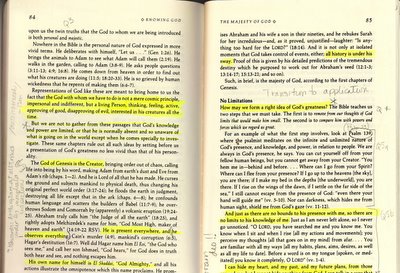How to Mark a Book

I am a book marker. I rarely read without a pencil in my hand and a highlighter at the ready. Even when I read borrowed books I have a pencil in my hand and a pad of post it notes nearby so that I can slap one on the page and scribble down my thoughts. I have a system that I developed over time and it works for me.
Today I came across an excellent essay, How to Mark a Book by Mortimer J. Adler, Ph.D. Most of his suggestions I had already implemented in my own fashion, but he also had some new ideas.
The front end-papers are to me the most important. Some people reserve them for a fancy bookplate. I reserve them for fancy thinking. After I have finished reading the book and making my personal index on the back end-papers, I turn to the front and try to outline the book, not page by page or point by point (I've already done that at the back), but as an integrated structure, with a basic unity and an order of parts. This outline is, to me, the measure of my understanding of the work.I have always used my front fly sheets for overflow notes and observations, but not for the kind of post reading reflection Dr. Adler suggests.
He also made this point:
You may have one final objection to marking books. You can't lend them to your friends because nobody else can read them without being distracted by your notes. Furthermore, you won't want to lend them because a marked copy is kind of an intellectual diary, and lending it is almost like giving your mind away.I'll add another reason. If you lend it and you never get it back, not only is it "almost like giving a piece of your mind away" it is also like losing a piece of your mind.
If your friend wishes to read your Plutarch's Lives, Shakespeare, or The Federalist Papers, tell him gently but firmly, to buy a copy. You will lend him your car or your coat -- but your books are as much a part of you as your head or your heart.
I need all my mind.
There is one thing he didn't mention that I have found very useful, especially if I am preparing a lesson over the material. When the author gives a definition, even if it is a very common word, I always circle the work and draw a line from the word out to the margin and write 'def.' Usually when an author gives a definition it is either because he is using a technical word (such as in theological or scientific works) or he is amplifying how HE is using the word. I have learned not to assume I know the meanings of words simply by the dictionary definitions because "usage matters".
Sometimes I'll run across a word whose definition I don't know. I'll circle it, draw the line out to the margin and write "def?", which tells me I need to check the dictionary.
So here's the question of the day: Are you a book marker? And, if so, do you have any favorite techniques you have developed or learned along the way that you'd like to share?
[update]
Just ordered Dr. Adler's book, How to Read a Book
You can look at the table of contents at the Amazon link. Looks good.
[update 2]
Missmellifluous has posted a link to "The Love Affairs of a Bibliomaniac" by Eugene Fields. Recommended reading by my sister, Kathy. The fabulous Missm has an excerpt on her blog this morning. It will draw you in. . .I promise.

<< Home